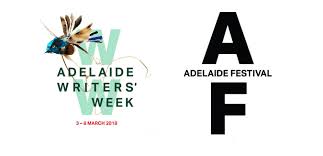
I’ve been coming to Adelaide Writers’ week with colleagues from Elwood Writers for the past three years now and it’s by far the best writers’ festival I’ve been to. Here I am again for Writers’ Week 2018. There are 14 sessions every day – one has to pick and choose, so here I will mention just a few that interested me.
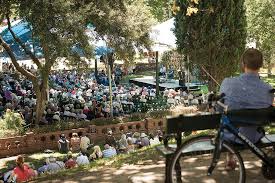
Bernice Chauly, Michelle de Kretser and Vivek Shanbhag spoke in a session entitled ‘Lost Things’. Bernice’s book, Once We Were There focuses on the Reformasi movement in Kuala Lumpur. Her book, she said, was triggered by the jailing of Anwar for sodomy – it’s not talked about. She implied that by writing in English she could say things that others might not dare to put in print. She admits that it is a bleak book. Malaysia, she said, is a fractured country.
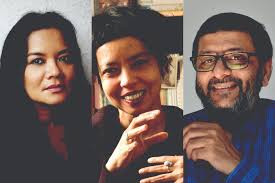
In Michelle de Kretser’s new book The Life to Come, narrative is linked by a recurring character, Pippa, a writer. Five stories unfold: a tale of youthful ambition, a tale of young love, a story about an émigré Australian in Paris who questions her life’s meaning and the commitment of her married female lover, there is a tale of motherhood and betrayal, and finally a tale of the awfulness of dementia.
Vivek Shanbhag’s book Ghachar Ghochar has been translated into English. While this has given him a much wider audience, he mentioned some of the difficulties, most interestingly, I thought, the need to translate into English what is not said. The book is a family drama set in Bangalore. He read a beautiful passage about the pervasiveness of ants.
Various themes were covered in this session. Families: Michelle found writing about families alluring from when, as an undergraduate, she studied kinship lines in Anthropology. Vivek described how, in India, every decision a person makes must be considered through the family, although, he admits, this is starting to change. Violence was another theme. Michelle mentioned that there are not many books about friendships between ‘grown-up’ women – maybe this is why the Eleanor Ferrente novels were so popular. Food was another theme. Bernice saw food as a salve, ‘it’s what binds us together’.
I then went to a session entitled ‘Invented Histories’, where Catherine McKinnon spoke about her novel Storyland, and Jane Rawson spoke about From the Wreck. The structure of Catherine’s book is interesting, with five narrators talking from different times in history (including the future and the far future) bound together by the one environment, Lake Illawarra. Catherine said that her writing was triggered by asking: What does it mean to be Australian today?
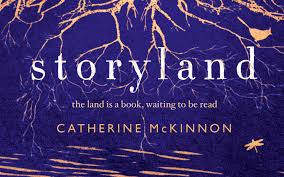
Jane Rawson’s book is her second novel. She said that she’s preoccupied by thoughts of ecological disaster and how humans relate to nature. The ‘historical’ character in this story is based on Jane’s great-great grandfather. The character George Hills, survives the sinking of the steamship Admella off the South Australian coast in 1859. He is haunted by memories of the disappearance of a fellow survivor, and his life becomes intertwined with that of a woman from another dimension, who seeks refuge on Earth. Jane said she wasn’t comfortable writing purely in a historical mode, so the woman is an alien: a fascinating mixture of the genres of historical and speculative fiction. Jane said she’s fascinated by our inability to think outside the time in which we are living.

The Adelaide Festival Awards for Literature were announced, with the premier present to give the Premier’s Award to Eva Hornung. http://arts.sa.gov.au/2018-adelaide-festival-awards-literatureOther winners were, Justine Larbalestier, Pam Brown, Tim Winton (who donated his prize money to research into preservation of the Great Barrier Reef), Emily Steel, Annette Marner, Jude Aquilina, Danielle Clode and Edoardo Crismani.
Finally I went to a session entitled ‘War and Peace’, which featured journalist John Lyons and American writer Sarah Sentilles. John has written a memoir, Balcony Over Jerusalem, in which he chronicles 6 years of living in Israel and gives a scathing account of the treatment of Palestinians.
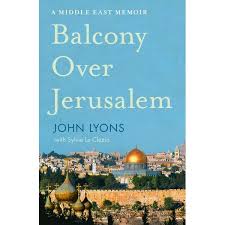
In her book, Draw Your Weapons, Sarah Sentilles explores her responses to photographs of Abu Ghraib, she particularly spoke of the responses of a guard there, who ended up ‘befriending’ prisoners and teaching them to play chess among other things.
The discussion focused on: Is it possible for human beings to live at peace? Both writers started with readings from their books where they described humans observing fighting in war as though it were a spectator sport. John said that people sit in cafes in Israel and when they get a ‘code red’ app on their phones they go to watch the trouble. Sarah spoke of an American conscientious objector to fighting in World War II – and, although a pacifist, she questioned whether, given the atrocities carried out by the Nazis, it is acceptable to opt out of fighting. There was reference to Hannah Arendt’s observations of the Nazi trials and the claim, ‘It wasn’t me who did that. I was carrying out someone else’s orders’. The question of whether we inherit trauma was discussed. Sarah referred to an experiment carried out with mice, where one generation was made to hate the smell of cherry blossoms and this hate was passed on through several generations. Another area of discussion was: can we become more empathetic? Sarah suggested that rather than empathy we need to learn how to respect ‘otherness’ – to build on an ethical system that deals with dis-ease.
What an interesting day you had Jenny – sounds like there are a host of very diverse writers there. Historical mixed with speculative fiction – intriguing! I’m missing it all I can tell you. That first play at the Festival sounded very out there. Will be glued to the blog this week!
LikeLike
“Vivek described how, in India, every decision a person makes must be considered through the family, …” This is fascinating to me as I have an Indian nephew-in-law, and also because I think I am not that much different to the Indians. So, food for thought there. Thanks Jennifer.
LikeLike